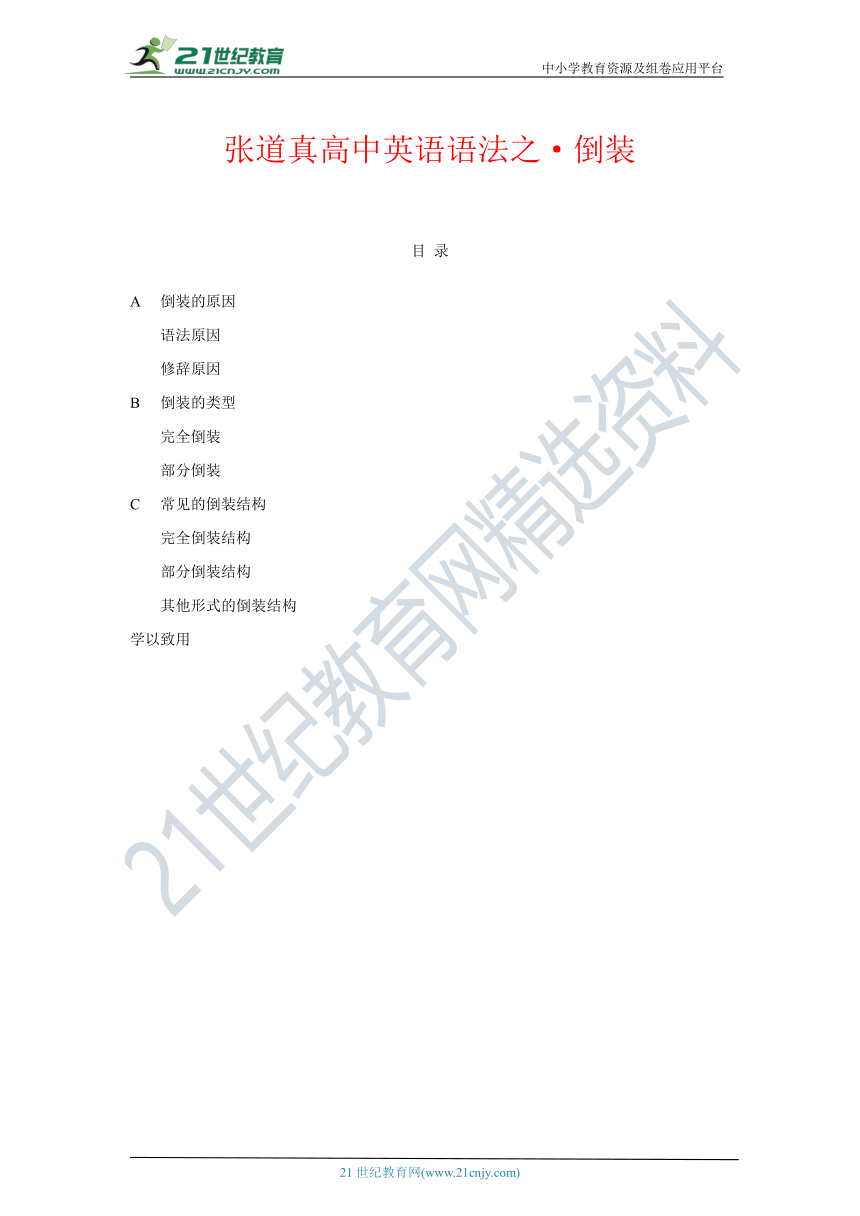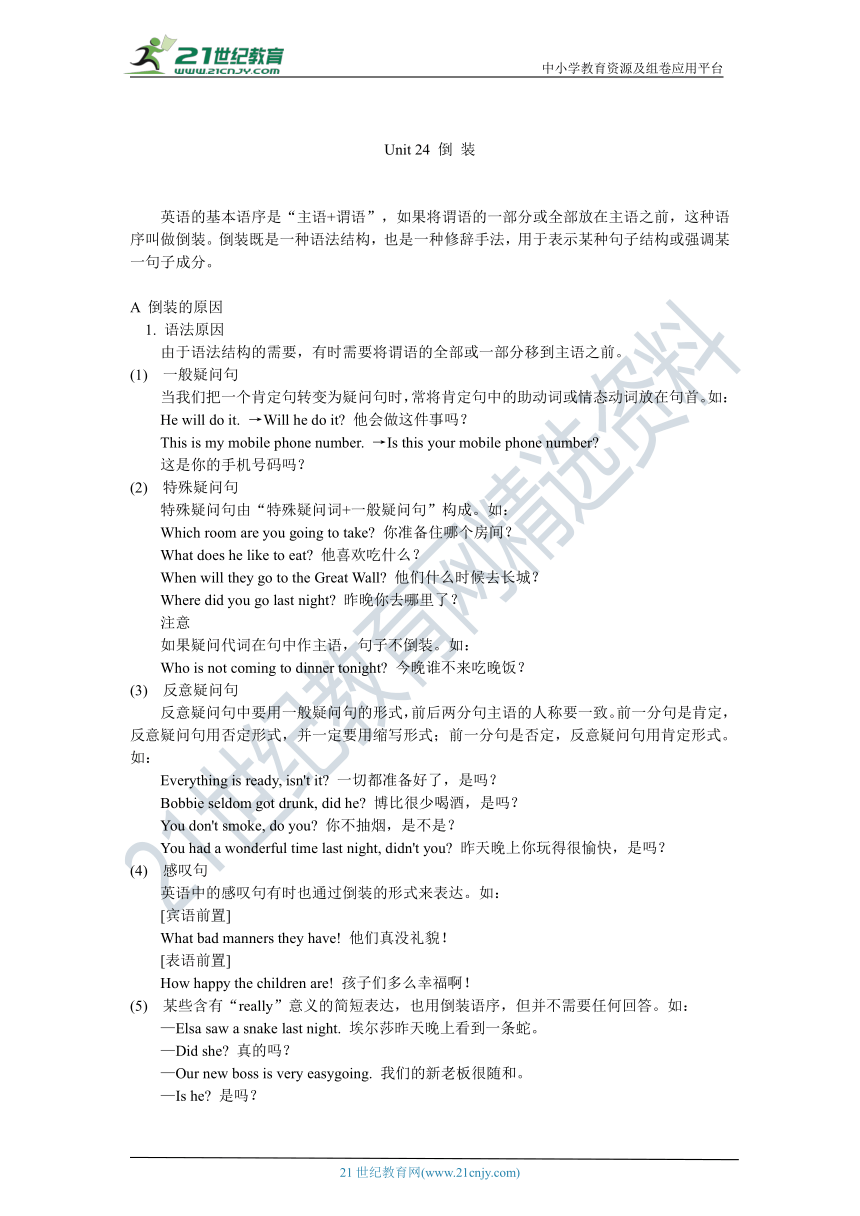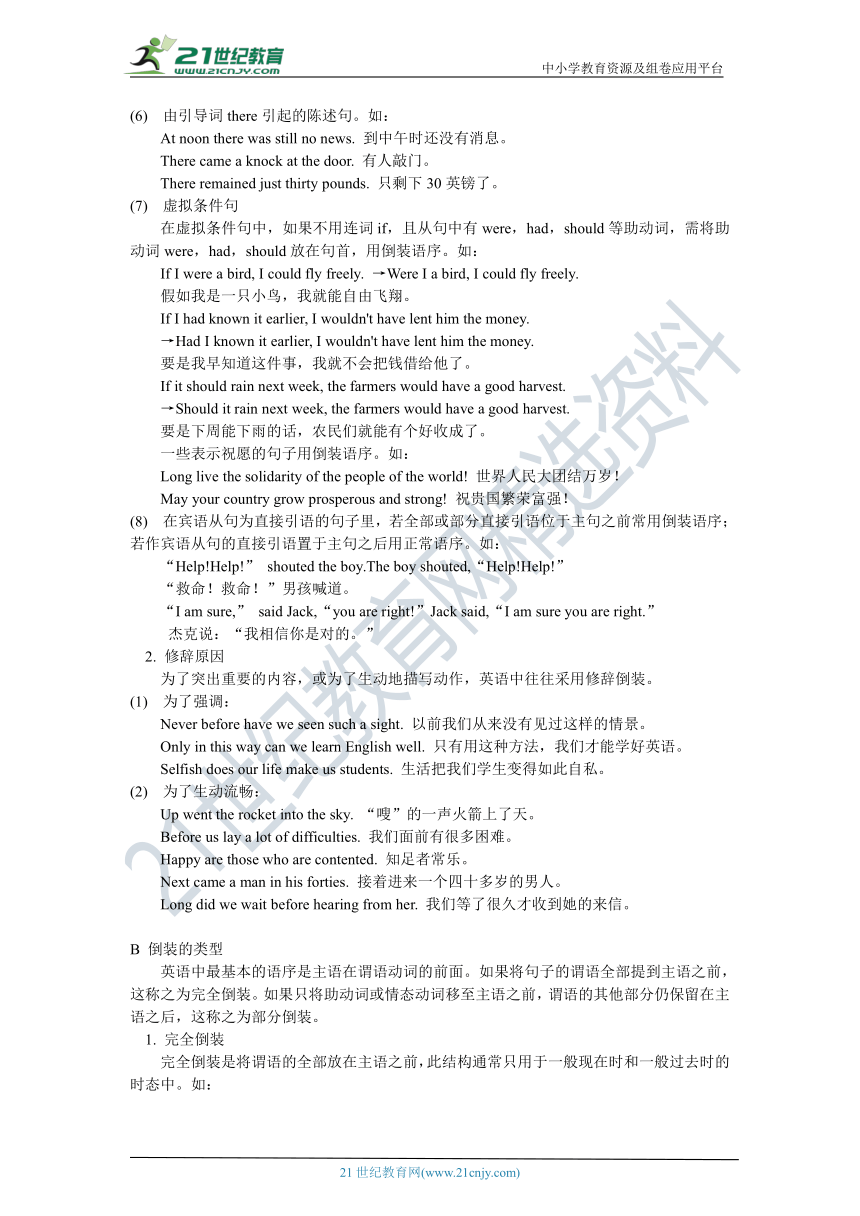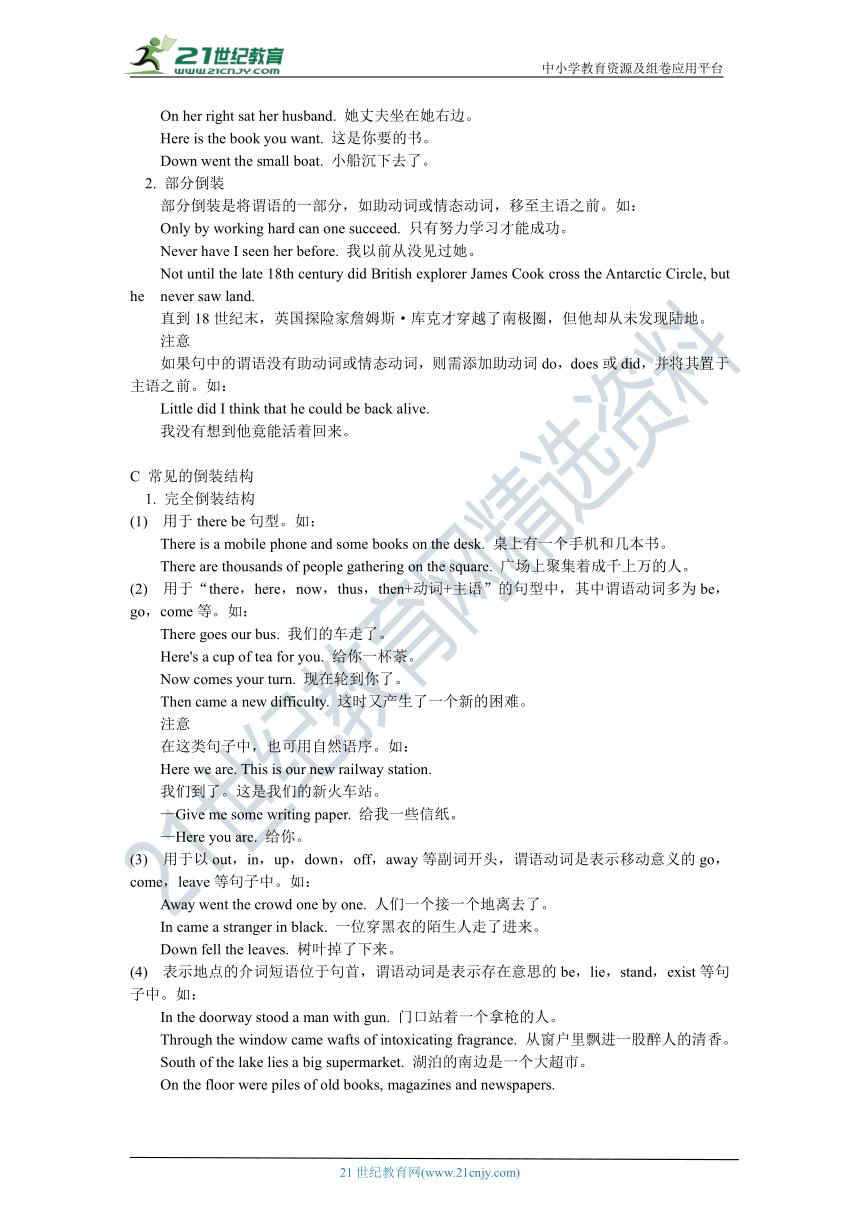高中英语语法之24倒装
图片预览




文档简介
中小学教育资源及组卷应用平台
张道真高中英语语法之·倒装
目 录
A 倒装的原因
???? 语法原因
???? 修辞原因
B 倒装的类型
???? 完全倒装
???? 部分倒装
C 常见的倒装结构
???? 完全倒装结构
???? 部分倒装结构
????其他形式的倒装结构
学以致用
Unit 24 倒 装
英语的基本语_????????????è??+_谓语”,如果将谓语的一部分或全部放在主语之前,这种语序叫做倒装。倒装既是一种语法结构,也是一种修辞手法,用于表示某种句子结构或强调某一句子成分。21cnjy.com
A 倒装的原因
1. 语法原因
由于语法结构的需要,有时需要将谓语的全部或一部分移到主语之前。
(1) 一般疑问句
当我们把一个肯定句转变为疑问句时,常将肯定句中的助动词或情态动词放在句首。如:
He will do it. →Will he do it? 他会做这件事吗?
This is my mobile phone number. →Is this your mobile phone number?
这是你的手机号码吗?
(2) 特殊疑问句
特殊疑问句由“特殊疑问词+一般疑问句”构成。如:
Which room are you going to take? 你准备住哪个房间?
What does he like to eat? 他喜欢吃什么?
When will they go to the Great Wall? 他们什么时候去长城?
Where did you go last night? 昨晚你去哪里了?
注意
如果疑问代词在句中作主语,句子不倒装。如:
Who is not coming to dinner tonight? 今晚谁不来吃晚饭?
(3) 反意疑问句
反意疑问句中要用一般_???é??????????????_,前后两分句主语的人称要一致。前一分句是肯定,反意疑问句用否定形式,并一定要用缩写形式;前一分句是否定,反意疑问句用肯定形式。如:21教育网
Everything is ready, isn't it? 一切都准备好了,是吗?
Bobbie seldom got drunk, did he? 博比很少喝酒,是吗?
You don't smoke, do you? 你不抽烟,是不是?
You had a wonderful time last night, didn't you? 昨天晚上你玩得很愉快,是吗?
(4) 感叹句
英语中的感叹句有时也通过倒装的形式来表达。如:
[宾语前置]
What bad manners they have! 他们真没礼貌!
[表语前置]
How happy the children are! 孩子们多么幸福啊!
(5) 某些含有“really”意义的简短表达,也用倒装语序,但并不需要任何回答。如:
—Elsa saw a snake last night. 埃尔莎昨天晚上看到一条蛇。
—Did she? 真的吗?
—Our new boss is very easygoing. 我们的新老板很随和。
—Is he? 是吗?
(6) 由引导词there引起的陈述句。如:
At noon there was still no news. 到中午时还没有消息。
There came a knock at the door. 有人敲门。
There remained just thirty pounds. 只剩下30英镑了。
(7) 虚拟条件句
在虚拟条件句_?????????????????¨_连词if,且从句中有were,had,should等助动词,需将助动词were,had,should放在句首,用倒装语序。如:21*cnjy*com
If I were a__bird,_ I could fly freely. →Were I a bird, I could fly freely.
假如我是一只小鸟,我就能自由飞翔。
If I had known it earlier, I wouldn't have lent him the money. 【版权所有:21教育】
→Had I known it earlier, I wouldn't have lent him the money. 21教育名师原创作品
要是我早知道这件事,我就不会把钱借给他了。
If it should rain next week, the farmers would have a good harvest.
→Should it rain next week, the farmers would have a good harvest.
要是下周能下雨的话,农民们就能有个好收成了。
一些表示祝愿的句子用倒装语序。如:
Long live the solidarity of the people of the world! 世界人民大团结万岁!
May your country grow prosperous and strong! 祝贵国繁荣富强!
(8) 在宾语从句为直接引语的句子里,若全部或部分直接引语位于主句之前常用倒装语序;若作宾语从句的直接引语置于主句之后用正常语序。如:
“Help!Help!” shouted the boy.The boy shouted,“Help!Help!”
“救命!救命!”男孩喊道。
“I am sur_e,???_sa_id Jack,“you are right!”Jack said,“I am sure you are right.”
杰克说:“我相信你是对的。”
2. 修辞原因
为了突出重要的内容,或为了生动地描写动作,英语中往往采用修辞倒装。
(1) 为了强调:
Never before have we seen such a sight. 以前我们从来没有见过这样的情景。
Only in this way can we learn English well. 只有用这种方法,我们才能学好英语。
Selfish does our life make us students. 生活把我们学生变得如此自私。
(2) 为了生动流畅:
Up went the rocket into the sky. “嗖”的一声火箭上了天。
Before us lay a lot of difficulties. 我们面前有很多困难。
Happy are those who are contented. 知足者常乐。
Next came a man in his forties. 接着进来一个四十多岁的男人。
Long did we wait before hearing from her. 我们等了很久才收到她的来信。
B 倒装的类型
英语中最基本的语序是主语_??¨è°?è????¨è?????_前面。如果将句子的谓语全部提到主语之前,这称之为完全倒装。如果只将助动词或情态动词移至主语之前,谓语的其他部分仍保留在主语之后,这称之为部分倒装。
1. 完全倒装
完全倒装是将谓语的全部放在主语之前,此结构通常只用于一般现在时和一般过去时的时态中。如:
On her right sat her husband. 她丈夫坐在她右边。
Here is the book you want. 这是你要的书。
Down went the small boat. 小船沉下去了。
2. 部分倒装
部分倒装是将谓语的一部分,如助动词或情态动词,移至主语之前。如:
Only by working hard can one succeed. 只有努力学习才能成功。
Never have I seen her before. 我以前从没见过她。
Not until the l_ate_18_th century did British explorer James Cook cross the Antarctic Circle, but he never saw land.
直到18世纪末,英国探险家詹姆斯·库克才穿越了南极圈,但他却从未发现陆地。
注意
如果句中的谓语没有助动词或情态动词,则需添加助动词do,does或did,并将其置于主语之前。如:www-2-1-cnjy-com
Little did I think that he could be back alive.
我没有想到他竟能活着回来。
C 常见的倒装结构
1. 完全倒装结构
(1) 用于there be句型。如:
There is a mobile phone and some books on the desk. 桌上有一个手机和几本书。
There are t_housan_ds of people gathering on the square. 广场上聚集着成千上万的人。
(2) 用于“there,here,now,thus,then+动词+主语”的句型中,其中谓语动词多为be,go,come等。如:21*cnjy*com
There goes our bus. 我们的车走了。
Here's a cup of tea for you. 给你一杯茶。
Now comes your turn. 现在轮到你了。
Then came a new difficulty. 这时又产生了一个新的困难。
注意
在这类句子中,也可用自然语序。如:
Here we are. This is our new railway station.
我们到了。这是我们的新火车站。
—Give me some writing paper. 给我一些信纸。
—Here you are. 给你。
(3) 用于以out,in,up,down,off,away等副词开头,谓语动词是表示移动意义的go,come,leave等句子中。如:【来源:21cnj*y.co*m】
Away went the crowd one by one. 人们一个接一个地离去了。
In came a stranger in black. 一位穿黑衣的陌生人走了进来。
Down fell the leaves. 树叶掉了下来。
(4) 表示地点的介词短语位于句首,谓语动词是表示存在意思的be,lie,stand,exist等句子中。如:21·世纪*教育网
In the doorway stood a man with gun. 门口站着一个拿枪的人。
Through the__windo_w came wafts of intoxicating fragrance. 从窗户里飘进一股醉人的清香。
South of the lake lies a big supermarket. 湖泊的南边是一个大超市。
On the floor were piles of old books, magazines and newspapers.
地板上放着一堆旧书、杂志和报纸。
(5) 用于“表语+连系动词+主语”结构。如:
Lucky is she who was admitted to a famous university last year.
她很幸运,去年被一所名牌大学录取了。
The most widely distributed is the Hui people. 分布最广的是回族。
Housed in th_e_Cult_ural Palace are a library, an auditorium and recreation rooms.
文化宫里有图书馆、礼堂和游艺室。
2. 部分倒装结构
(1) 含有否定意义的副词_???è??è????????n_ot,seldom,little,hardly,never,rarely,nowhere,not until等)放在句首时。如:
He can't _speak__a single word of English. →Not a single word of English can he speak.
他连一个英语单词都不会说。
The old professor cares little about his clothes.
→Little does the old professor care about his clothes. 老教授不在乎穿着。
The mother didn't leave the room until the child fell asleep.
→Not until the child fell asleep did the mother leave the room.
直到孩子睡着了,妈妈才离开房间。
I shall by no means give up. →By no means shall I give up. 我决不放弃。
(2) “副词only+状语”放在句首时。如:
Only in this way can our honour be saved. 只有这样,才能保住我们的荣誉。
Only when he _is_ser_iously ill does he ever stay in bed. 只有病重时,他才待在床上。
Only then did I see life was not easy. 只有到了那时,我才知道生活是不易的。
(3) so意为“也”时,引导_???????????¨???è??_语序,表示前面所说的肯定情况也适用于另一人或物。其结构是:So+be(have,助动词或情态动词)+主语。如:
I like hard chairs. So do I. 我喜欢硬椅。我也是。
Cheney can send an e-mail to his former classmates. So can she.
采尼能发电子邮件给以前的同学,她也能。
He went to the film last night. So did I. 昨天晚上他去看电影了,我也去了。
注意
如果so表示对前面所说的内容加以肯定,或不作“也”讲而只起连词作用,表示“一种结果”的意思,so引导的句子就不用倒装。如:
—Jack won the first prize in the contest. 杰克在比赛中获得了一等奖。
—So he did. 他的确是。
—It is cold today. 今天很冷。
—So it is and so was it yesterday. 确实很冷,昨天也很冷。
His mother told him to go to the film. So he did.
他母亲叫他去看电影,他就去了。
(4) neither / nor引导的句子用倒装语序,用于对前面所说的否定内容表示同样的看法。如:
I can't swim!Neither can She! 我不会游泳!她也不会!
He never went again, nor did he write to apologize. 他没再去,也没回信表示歉意。
I don't smoke and neither does my wife. 我不吸烟,我夫人也不吸烟。
注意
如果前面所说_???????????????è??_定又有否定,或前后的谓语动词形式不一致时,用“It is the same with+主语”结构或用“So it is with+主语”结构。如:
He worked hard, but didn't pass the exam. So it was with his sister.
他很努力,但没有通过考试,他妹妹也是这样。(既有肯定又有否定)
She is a teacher and she enjoys teaching. So it is with Mr Li.
她是老师,热爱教书。李先生也是这样。(一个谓语动词是系动词,另一个是实义动词)
(5) “so...that...”和“such...that...”结构中的so或such位于句首时。如:
Gary was so excited that he could not say a word.
→So excited was Gary that could not say a word.
加里如此激动以至于一句话都说不出来。
His anger was such that he lost control of himself.【出处:21教育名师】
→Such was his anger that he lost control of himself.
他是如此的生气以至于不能控制自己。
(6) 一些表示频率的副词(如many a time,often等)位于句首时。如:
I have seen her taking a walk alone many a time.
→Many a time have I seen her taking a walk alone. 我多次看到她独自一人在散步。
Ellen often came to my house in the past.
→Often did she come to my house in the past. 过去,埃伦常常来我家。
(7) 表示方式、程度的副词位于句首时。如:
Well do I remember the day when I joined the Party. 我对入党的那一天还记忆犹新。
Gladly would I accept your proposal. 我很高兴接受你的建议。2·1·c·n·j·y
(8) 非谓语动词+be+主语。如:
Covering _much_o_f the earth's surface is a blanket of water. 覆盖地球表面的大部分是水。
Also discussed were the problems we had met with in our studies. 2-1-c-n-j-y
同时还讨论了我们在学习中遇到的问题。
First to unfold was the map of the world. 首先打开的是世界地图。
3. 其他形式的倒装结构
(1) 宾语位于句首,表示强调。如:
The past one can know, but the future one can only feel.
一个人可以了解过去,但只能感悟未来。
What Julia did I cannot imagine. 我想象不出朱莉娅做了什么。
Every__word__he spoke to her, she felt as an insult. 他对她说的每一个字,她都认为是侮辱。
(2) the more...the more...结构中的倒装。如:
[表语前置,状语前置]
The harder you work, the happier you feel. 你工作越努力,就越觉得快乐。
[宾语前置]
The more you study, the more you know. 你学得越多,就知道得越多。
(3) as / though在让步状语从句中的倒装。
表语提前,构成倒装。如:
Though it _may_se_em strange, he arrived early.→Strange though it may seem, he arrived early.
尽管看来很奇怪,他却到达得很早。
Although h_e_is_a_ child, he speaks fluent English. →Child as he is, he speaks fluent English.
虽然他还是一个孩子,但能讲流利的英语。
(名词单数提前置于句首时,不用不定冠词a。)
动词提前,构成倒装。如:
Though they searched, they could not find anything in the house. 21·cn·jy·com
→Search as they did, they could not find anything in the house.
虽然他们搜查了,但在房间里没找到任何东西。
Though she__may_t_ry again, she won't pass it. →Try again as she may, she won't pass it.
尽管她愿意再试,但她还是不会通过的。
副词提前,构成倒装。如:
Though I liste_ned_at_tentively, I still couldn't understand what he said at the meeting.
→Atten_tively_ as I listened, I still couldn't understand what he said at the meeting.
尽管我专心听了,但我还是听不懂他在会上说的话。
Though he ran the fastest, he still didn't catch the train. www.21-cn-jy.com
→Fastest a_s_he_r_an, he still didn't catch the train. 尽管他跑得最快,但仍没有赶上火车。
(4) 一些习惯说法中使用倒装语序。如:
How goes it with you? 你好吗?
What care I? 管我什么事?
What matters it? 这有什么关系呢?
Hardly had I got home when the telephone rang. 我一到家,电话就响了。
Such were his last words. 他最后的话就是这样。
(5) 在比较状语从句和方式状语从句中的倒装。
在复合句中,than或as引导的分句,如果谓语动词或表语省略,且是两个句子的主语相比较时,要用倒装语序。如:
John will give you more than will Jack. 约翰给你的要比杰克多。
Kenny is responsible a man as are you. 肯尼像你一样负责。
(6) 从句中关系代词或关系副词的倒装。
宾语从句中表语前置。如:
He couldn't tell where his home was. 他没有说他家的住处。
主语从句中宾语前置。如:
Whatever I have is at your service. 我所有的东西请随便使用。
状语从句中状语前置。如:
However fast he may run, he will never catch up with Jim.
尽管他跑得很快,但还是没有赶上吉姆。
_21?????????è?????(www.21cnjy.com)_
张道真高中英语语法之·倒装
目 录
A 倒装的原因
???? 语法原因
???? 修辞原因
B 倒装的类型
???? 完全倒装
???? 部分倒装
C 常见的倒装结构
???? 完全倒装结构
???? 部分倒装结构
????其他形式的倒装结构
学以致用
Unit 24 倒 装
英语的基本语_????????????è??+_谓语”,如果将谓语的一部分或全部放在主语之前,这种语序叫做倒装。倒装既是一种语法结构,也是一种修辞手法,用于表示某种句子结构或强调某一句子成分。21cnjy.com
A 倒装的原因
1. 语法原因
由于语法结构的需要,有时需要将谓语的全部或一部分移到主语之前。
(1) 一般疑问句
当我们把一个肯定句转变为疑问句时,常将肯定句中的助动词或情态动词放在句首。如:
He will do it. →Will he do it? 他会做这件事吗?
This is my mobile phone number. →Is this your mobile phone number?
这是你的手机号码吗?
(2) 特殊疑问句
特殊疑问句由“特殊疑问词+一般疑问句”构成。如:
Which room are you going to take? 你准备住哪个房间?
What does he like to eat? 他喜欢吃什么?
When will they go to the Great Wall? 他们什么时候去长城?
Where did you go last night? 昨晚你去哪里了?
注意
如果疑问代词在句中作主语,句子不倒装。如:
Who is not coming to dinner tonight? 今晚谁不来吃晚饭?
(3) 反意疑问句
反意疑问句中要用一般_???é??????????????_,前后两分句主语的人称要一致。前一分句是肯定,反意疑问句用否定形式,并一定要用缩写形式;前一分句是否定,反意疑问句用肯定形式。如:21教育网
Everything is ready, isn't it? 一切都准备好了,是吗?
Bobbie seldom got drunk, did he? 博比很少喝酒,是吗?
You don't smoke, do you? 你不抽烟,是不是?
You had a wonderful time last night, didn't you? 昨天晚上你玩得很愉快,是吗?
(4) 感叹句
英语中的感叹句有时也通过倒装的形式来表达。如:
[宾语前置]
What bad manners they have! 他们真没礼貌!
[表语前置]
How happy the children are! 孩子们多么幸福啊!
(5) 某些含有“really”意义的简短表达,也用倒装语序,但并不需要任何回答。如:
—Elsa saw a snake last night. 埃尔莎昨天晚上看到一条蛇。
—Did she? 真的吗?
—Our new boss is very easygoing. 我们的新老板很随和。
—Is he? 是吗?
(6) 由引导词there引起的陈述句。如:
At noon there was still no news. 到中午时还没有消息。
There came a knock at the door. 有人敲门。
There remained just thirty pounds. 只剩下30英镑了。
(7) 虚拟条件句
在虚拟条件句_?????????????????¨_连词if,且从句中有were,had,should等助动词,需将助动词were,had,should放在句首,用倒装语序。如:21*cnjy*com
If I were a__bird,_ I could fly freely. →Were I a bird, I could fly freely.
假如我是一只小鸟,我就能自由飞翔。
If I had known it earlier, I wouldn't have lent him the money. 【版权所有:21教育】
→Had I known it earlier, I wouldn't have lent him the money. 21教育名师原创作品
要是我早知道这件事,我就不会把钱借给他了。
If it should rain next week, the farmers would have a good harvest.
→Should it rain next week, the farmers would have a good harvest.
要是下周能下雨的话,农民们就能有个好收成了。
一些表示祝愿的句子用倒装语序。如:
Long live the solidarity of the people of the world! 世界人民大团结万岁!
May your country grow prosperous and strong! 祝贵国繁荣富强!
(8) 在宾语从句为直接引语的句子里,若全部或部分直接引语位于主句之前常用倒装语序;若作宾语从句的直接引语置于主句之后用正常语序。如:
“Help!Help!” shouted the boy.The boy shouted,“Help!Help!”
“救命!救命!”男孩喊道。
“I am sur_e,???_sa_id Jack,“you are right!”Jack said,“I am sure you are right.”
杰克说:“我相信你是对的。”
2. 修辞原因
为了突出重要的内容,或为了生动地描写动作,英语中往往采用修辞倒装。
(1) 为了强调:
Never before have we seen such a sight. 以前我们从来没有见过这样的情景。
Only in this way can we learn English well. 只有用这种方法,我们才能学好英语。
Selfish does our life make us students. 生活把我们学生变得如此自私。
(2) 为了生动流畅:
Up went the rocket into the sky. “嗖”的一声火箭上了天。
Before us lay a lot of difficulties. 我们面前有很多困难。
Happy are those who are contented. 知足者常乐。
Next came a man in his forties. 接着进来一个四十多岁的男人。
Long did we wait before hearing from her. 我们等了很久才收到她的来信。
B 倒装的类型
英语中最基本的语序是主语_??¨è°?è????¨è?????_前面。如果将句子的谓语全部提到主语之前,这称之为完全倒装。如果只将助动词或情态动词移至主语之前,谓语的其他部分仍保留在主语之后,这称之为部分倒装。
1. 完全倒装
完全倒装是将谓语的全部放在主语之前,此结构通常只用于一般现在时和一般过去时的时态中。如:
On her right sat her husband. 她丈夫坐在她右边。
Here is the book you want. 这是你要的书。
Down went the small boat. 小船沉下去了。
2. 部分倒装
部分倒装是将谓语的一部分,如助动词或情态动词,移至主语之前。如:
Only by working hard can one succeed. 只有努力学习才能成功。
Never have I seen her before. 我以前从没见过她。
Not until the l_ate_18_th century did British explorer James Cook cross the Antarctic Circle, but he never saw land.
直到18世纪末,英国探险家詹姆斯·库克才穿越了南极圈,但他却从未发现陆地。
注意
如果句中的谓语没有助动词或情态动词,则需添加助动词do,does或did,并将其置于主语之前。如:www-2-1-cnjy-com
Little did I think that he could be back alive.
我没有想到他竟能活着回来。
C 常见的倒装结构
1. 完全倒装结构
(1) 用于there be句型。如:
There is a mobile phone and some books on the desk. 桌上有一个手机和几本书。
There are t_housan_ds of people gathering on the square. 广场上聚集着成千上万的人。
(2) 用于“there,here,now,thus,then+动词+主语”的句型中,其中谓语动词多为be,go,come等。如:21*cnjy*com
There goes our bus. 我们的车走了。
Here's a cup of tea for you. 给你一杯茶。
Now comes your turn. 现在轮到你了。
Then came a new difficulty. 这时又产生了一个新的困难。
注意
在这类句子中,也可用自然语序。如:
Here we are. This is our new railway station.
我们到了。这是我们的新火车站。
—Give me some writing paper. 给我一些信纸。
—Here you are. 给你。
(3) 用于以out,in,up,down,off,away等副词开头,谓语动词是表示移动意义的go,come,leave等句子中。如:【来源:21cnj*y.co*m】
Away went the crowd one by one. 人们一个接一个地离去了。
In came a stranger in black. 一位穿黑衣的陌生人走了进来。
Down fell the leaves. 树叶掉了下来。
(4) 表示地点的介词短语位于句首,谓语动词是表示存在意思的be,lie,stand,exist等句子中。如:21·世纪*教育网
In the doorway stood a man with gun. 门口站着一个拿枪的人。
Through the__windo_w came wafts of intoxicating fragrance. 从窗户里飘进一股醉人的清香。
South of the lake lies a big supermarket. 湖泊的南边是一个大超市。
On the floor were piles of old books, magazines and newspapers.
地板上放着一堆旧书、杂志和报纸。
(5) 用于“表语+连系动词+主语”结构。如:
Lucky is she who was admitted to a famous university last year.
她很幸运,去年被一所名牌大学录取了。
The most widely distributed is the Hui people. 分布最广的是回族。
Housed in th_e_Cult_ural Palace are a library, an auditorium and recreation rooms.
文化宫里有图书馆、礼堂和游艺室。
2. 部分倒装结构
(1) 含有否定意义的副词_???è??è????????n_ot,seldom,little,hardly,never,rarely,nowhere,not until等)放在句首时。如:
He can't _speak__a single word of English. →Not a single word of English can he speak.
他连一个英语单词都不会说。
The old professor cares little about his clothes.
→Little does the old professor care about his clothes. 老教授不在乎穿着。
The mother didn't leave the room until the child fell asleep.
→Not until the child fell asleep did the mother leave the room.
直到孩子睡着了,妈妈才离开房间。
I shall by no means give up. →By no means shall I give up. 我决不放弃。
(2) “副词only+状语”放在句首时。如:
Only in this way can our honour be saved. 只有这样,才能保住我们的荣誉。
Only when he _is_ser_iously ill does he ever stay in bed. 只有病重时,他才待在床上。
Only then did I see life was not easy. 只有到了那时,我才知道生活是不易的。
(3) so意为“也”时,引导_???????????¨???è??_语序,表示前面所说的肯定情况也适用于另一人或物。其结构是:So+be(have,助动词或情态动词)+主语。如:
I like hard chairs. So do I. 我喜欢硬椅。我也是。
Cheney can send an e-mail to his former classmates. So can she.
采尼能发电子邮件给以前的同学,她也能。
He went to the film last night. So did I. 昨天晚上他去看电影了,我也去了。
注意
如果so表示对前面所说的内容加以肯定,或不作“也”讲而只起连词作用,表示“一种结果”的意思,so引导的句子就不用倒装。如:
—Jack won the first prize in the contest. 杰克在比赛中获得了一等奖。
—So he did. 他的确是。
—It is cold today. 今天很冷。
—So it is and so was it yesterday. 确实很冷,昨天也很冷。
His mother told him to go to the film. So he did.
他母亲叫他去看电影,他就去了。
(4) neither / nor引导的句子用倒装语序,用于对前面所说的否定内容表示同样的看法。如:
I can't swim!Neither can She! 我不会游泳!她也不会!
He never went again, nor did he write to apologize. 他没再去,也没回信表示歉意。
I don't smoke and neither does my wife. 我不吸烟,我夫人也不吸烟。
注意
如果前面所说_???????????????è??_定又有否定,或前后的谓语动词形式不一致时,用“It is the same with+主语”结构或用“So it is with+主语”结构。如:
He worked hard, but didn't pass the exam. So it was with his sister.
他很努力,但没有通过考试,他妹妹也是这样。(既有肯定又有否定)
She is a teacher and she enjoys teaching. So it is with Mr Li.
她是老师,热爱教书。李先生也是这样。(一个谓语动词是系动词,另一个是实义动词)
(5) “so...that...”和“such...that...”结构中的so或such位于句首时。如:
Gary was so excited that he could not say a word.
→So excited was Gary that could not say a word.
加里如此激动以至于一句话都说不出来。
His anger was such that he lost control of himself.【出处:21教育名师】
→Such was his anger that he lost control of himself.
他是如此的生气以至于不能控制自己。
(6) 一些表示频率的副词(如many a time,often等)位于句首时。如:
I have seen her taking a walk alone many a time.
→Many a time have I seen her taking a walk alone. 我多次看到她独自一人在散步。
Ellen often came to my house in the past.
→Often did she come to my house in the past. 过去,埃伦常常来我家。
(7) 表示方式、程度的副词位于句首时。如:
Well do I remember the day when I joined the Party. 我对入党的那一天还记忆犹新。
Gladly would I accept your proposal. 我很高兴接受你的建议。2·1·c·n·j·y
(8) 非谓语动词+be+主语。如:
Covering _much_o_f the earth's surface is a blanket of water. 覆盖地球表面的大部分是水。
Also discussed were the problems we had met with in our studies. 2-1-c-n-j-y
同时还讨论了我们在学习中遇到的问题。
First to unfold was the map of the world. 首先打开的是世界地图。
3. 其他形式的倒装结构
(1) 宾语位于句首,表示强调。如:
The past one can know, but the future one can only feel.
一个人可以了解过去,但只能感悟未来。
What Julia did I cannot imagine. 我想象不出朱莉娅做了什么。
Every__word__he spoke to her, she felt as an insult. 他对她说的每一个字,她都认为是侮辱。
(2) the more...the more...结构中的倒装。如:
[表语前置,状语前置]
The harder you work, the happier you feel. 你工作越努力,就越觉得快乐。
[宾语前置]
The more you study, the more you know. 你学得越多,就知道得越多。
(3) as / though在让步状语从句中的倒装。
表语提前,构成倒装。如:
Though it _may_se_em strange, he arrived early.→Strange though it may seem, he arrived early.
尽管看来很奇怪,他却到达得很早。
Although h_e_is_a_ child, he speaks fluent English. →Child as he is, he speaks fluent English.
虽然他还是一个孩子,但能讲流利的英语。
(名词单数提前置于句首时,不用不定冠词a。)
动词提前,构成倒装。如:
Though they searched, they could not find anything in the house. 21·cn·jy·com
→Search as they did, they could not find anything in the house.
虽然他们搜查了,但在房间里没找到任何东西。
Though she__may_t_ry again, she won't pass it. →Try again as she may, she won't pass it.
尽管她愿意再试,但她还是不会通过的。
副词提前,构成倒装。如:
Though I liste_ned_at_tentively, I still couldn't understand what he said at the meeting.
→Atten_tively_ as I listened, I still couldn't understand what he said at the meeting.
尽管我专心听了,但我还是听不懂他在会上说的话。
Though he ran the fastest, he still didn't catch the train. www.21-cn-jy.com
→Fastest a_s_he_r_an, he still didn't catch the train. 尽管他跑得最快,但仍没有赶上火车。
(4) 一些习惯说法中使用倒装语序。如:
How goes it with you? 你好吗?
What care I? 管我什么事?
What matters it? 这有什么关系呢?
Hardly had I got home when the telephone rang. 我一到家,电话就响了。
Such were his last words. 他最后的话就是这样。
(5) 在比较状语从句和方式状语从句中的倒装。
在复合句中,than或as引导的分句,如果谓语动词或表语省略,且是两个句子的主语相比较时,要用倒装语序。如:
John will give you more than will Jack. 约翰给你的要比杰克多。
Kenny is responsible a man as are you. 肯尼像你一样负责。
(6) 从句中关系代词或关系副词的倒装。
宾语从句中表语前置。如:
He couldn't tell where his home was. 他没有说他家的住处。
主语从句中宾语前置。如:
Whatever I have is at your service. 我所有的东西请随便使用。
状语从句中状语前置。如:
However fast he may run, he will never catch up with Jim.
尽管他跑得很快,但还是没有赶上吉姆。
_21?????????è?????(www.21cnjy.com)_
